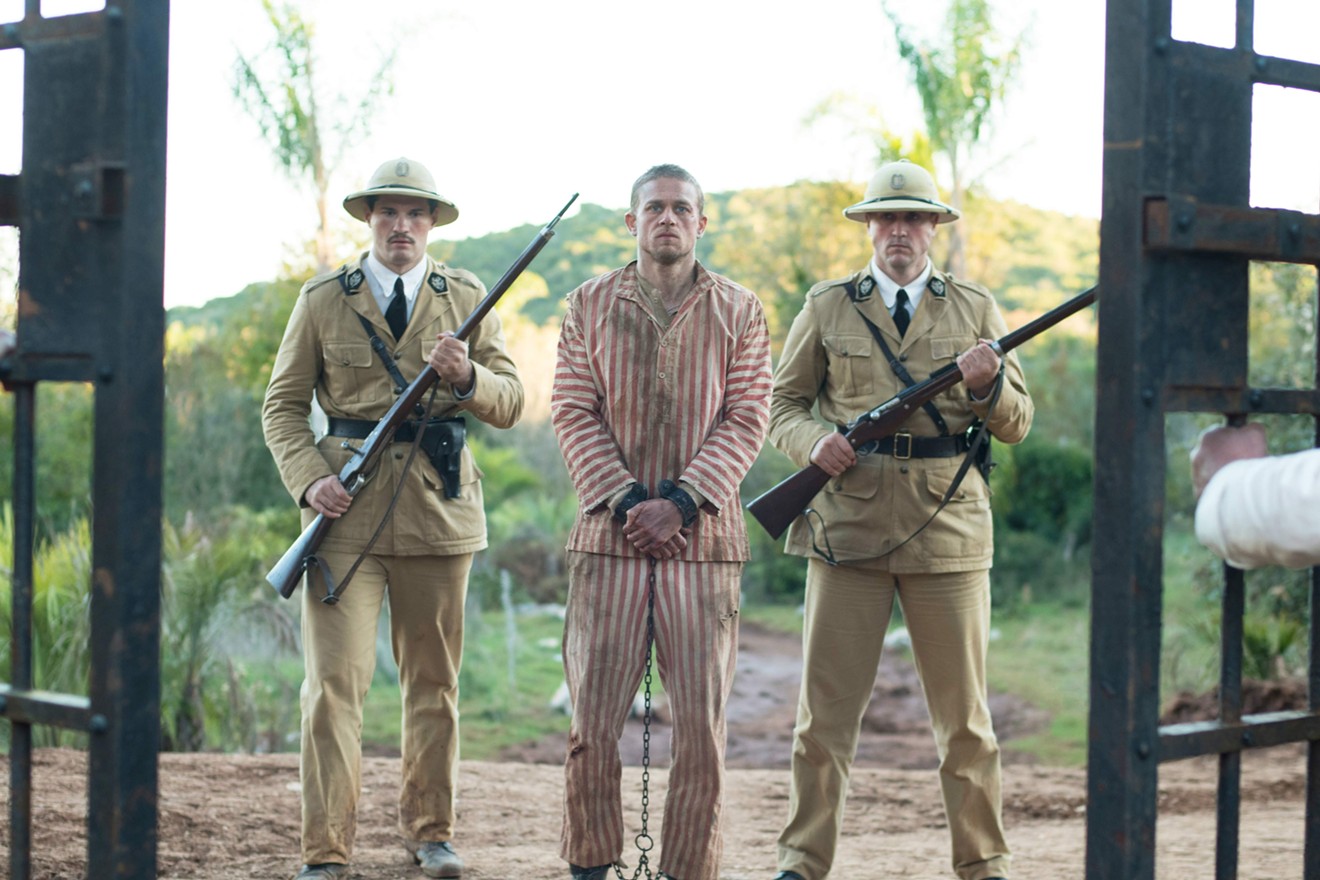Shit-streaked, blood-soaked and mud-caked, the French penal colony inmates of Papillon make for a compellingly sorry spectacle — men reduced to the status of animals, their bodies and faces turning to dirty, leathery sinew before our eyes. It’s impressive, and imperative: Seeing them like this makes the necessity of escape that much more critical. How could any human survive a day in this place, let alone a year, or two, or 10?
Papillon is based on the writings of Henri Charrière (played here by Charlie Hunnam), a Parisian thief who in 1931 was condemned, for a murder he did not commit, to a distant prison in the colony of French Guiana, and spent much of his time there planning his escape. The story was filmed before in 1973 with Steve McQueen as Charrière (nicknamed “Papillon” for the butterfly tattoo on his chest) and Dustin Hoffman as Louis Dega, a meek fellow prisoner and counterfeiter whose hidden money and logistical smarts aided Charrière in his efforts to flee. The director of that earlier film was Franklin J. Schaffner, who was fond of mounting stately period epics like Patton and Nicholas and Alexandra. And you can sense, in the 1973 effort’s languor and cerebral stoicism, a self-importance that pushes against the milieu of desperation. It’s still a fine movie — the stony McQueen and the mousy Hoffman make a good team — and has some cred today as a macho classic, but this is one case where a contemporary remake doesn’t seem like an entirely terrible idea.
This new version, directed by Danish filmmaker Michael Noer, brings to the story a refreshing intensity and sweep, and even a sense of adventure. It’s also unflinching when it comes to violence, misery and gore: We feel the savagery of the heat and the hatred, the sheer primordial guck in which these prisoners toil. That in turn makes the call of freedom that much more enthralling, and the rough, barbed alliance between Charrière and Dega (played here by Rami Malek) that much more convincing. Without Charrière, Dega cannot survive. Without Dega, Charrière cannot escape.
The script, by Aaron Guzikowski, remains a lot more faithful to the 1973 film (which was penned by two legends, Dalton Trumbo and Lorenzo Semple Jr.) than to Charrière’s written accounts, the veracity of which have always been in some dispute anyway. Both pictures feature lots of on-the-nose dialogue, the words working like cheat sheets to the characters’ motivations and the films’ themes: “This is for the greater good that is French expansion,” the prisoners are told in this new version, as they’re sent off to the colonies. “As for France, she has disowned you. … Forget France!” Or, here’s a line from Dega: “I should know how to throw a punch, given how often my father used to beat me.”
Nobody talks like this! But in Schaffner’s film, the unrealistic, expository dialogue meshed well with the director’s classicism. In this new version, there’s something of a disconnect between the immediacy of Noer’s stylistic approach and the unconvincing words the characters are uttering. Even so, the performers are excellent. Hunnam has, over the past several years, proven himself an actor of surprising refinement and grace, capable of physically articulating the subtlest of emotions. (His turn in The Lost City of Z might have been last year’s most undervalued performance.) He’s best here in the more quiet moments, achieving a deep, unreal stillness that can, with the slightest shift, reveal confidence or ruin. We understand early on that he’s a man who can and will protect the mousy Dega from the prison’s more loathsome denizens. But later on, after years of solitary confinement, abuse and humiliation, we also sense the existential change that has come over Charrière. From beneath his steely exterior, a certain fragility slowly comes to the fore.
As for Malek, he manages the opposite: He’s angular and fidgety, nervous and weak, but beneath all that vulnerability we sense a certain toughness, a killer instinct waiting to surface. (Spoiler alert: It does.) In a world that brings out the worst in everybody, these two men bring something good out of one another. It is both agonizing and joyful to watch.
[
{
"name": "Air - MediumRectangle - Inline Content - Mobile Display Size",
"component": "18855504",
"insertPoint": "2",
"requiredCountToDisplay": "2"
},{
"name": "Editor Picks",
"component": "17105533",
"insertPoint": "4",
"requiredCountToDisplay": "1"
},{
"name": "Inline Links",
"component": "18349797",
"insertPoint": "8th",
"startingPoint": 8,
"requiredCountToDisplay": "7",
"maxInsertions": 25
},{
"name": "Air - MediumRectangle - Combo - Inline Content",
"component": "17105532",
"insertPoint": "8th",
"startingPoint": 8,
"requiredCountToDisplay": "7",
"maxInsertions": 25
},{
"name": "Inline Links",
"component": "18349797",
"insertPoint": "8th",
"startingPoint": 12,
"requiredCountToDisplay": "11",
"maxInsertions": 25
},{
"name": "Air - Leaderboard Tower - Combo - Inline Content",
"component": "17105535",
"insertPoint": "8th",
"startingPoint": 12,
"requiredCountToDisplay": "11",
"maxInsertions": 25
}
]











